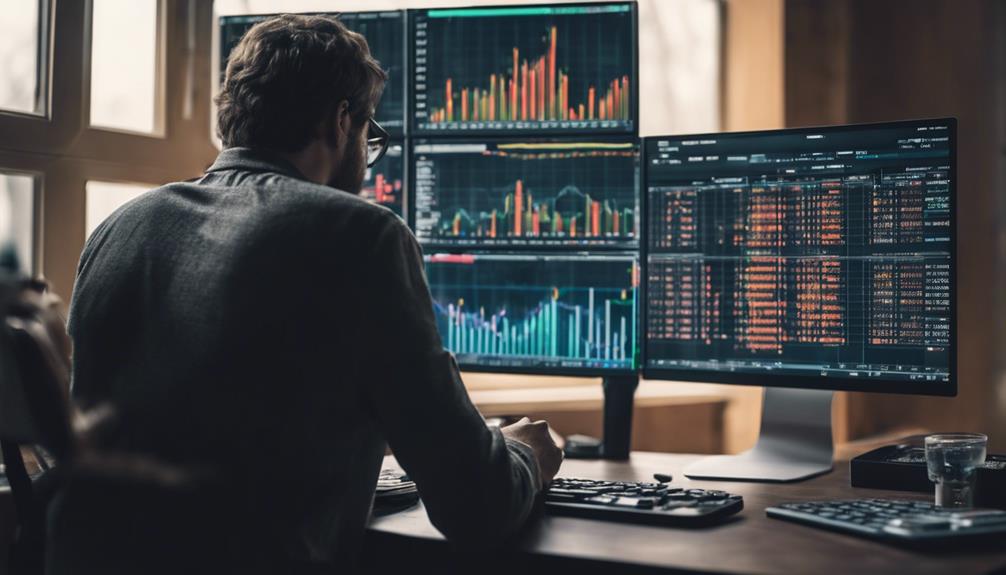Argentina's crypto revolution is fueled by Javier Milei's bold leadership. He became president in December 2023, promising sweeping economic reforms to combat staggering inflation. With an inflation rate exceeding 276%, it's no wonder that millions of Argentinians are turning to cryptocurrency for everyday transactions. The government recently recognized cryptocurrencies as legal currency, allowing innovative payment options in a struggling economy. Supported by international collaborations and a fresh regulatory framework, Milei's vision aims to propel Argentina to the forefront of the crypto market. Stick around, and you'll uncover how Argentina's financial landscape is evolving under this dynamic leadership.
Key Takeaways
- Javier Milei's administration promotes radical economic reforms, including the deregulation and privatization of state-owned firms to combat hyperinflation.
- Argentina's annual inflation rate of 276% has spurred widespread cryptocurrency adoption, with one-third of the population using it for transactions.
- Law N°27,739 recognizes cryptocurrencies for contract settlements, although they are not classified as legal tender, enhancing their usability in daily transactions.
- The National Securities Commission is set to regulate cryptocurrencies, establishing a framework that balances user protection with the need for innovation.
- Argentina's collaboration with El Salvador and international figures like Elon Musk aims to bolster its position as a leading crypto market in the Western hemisphere.
Political Landscape in Argentina

The political landscape in Argentina has dramatically shifted with the rise of the Libertarian Party under Javier Milei, who took office as President on December 10, 2023. His administration faces a challenging environment, holding just 37 of 257 seats in the Chamber of Deputies and 7 of 72 Senate seats.
To implement his radical policies, Milei must collaborate with center-right parties like the Republican Proposal and the Radical Civic Union, relying on their support to navigate a fragmented legislature. The long-standing dominance of Peronism, with the Justicialist Party controlling 91 deputies and 36 senators, presents a significant obstacle. Milei's election reflects deep public disillusionment with traditional parties and their handling of hyperinflation and economic crises.
His government's priorities include reducing spending, cutting red tape, and promoting privatization, all aimed at distancing Argentina from decades of state-led economic policies. The government's success hinges on overcoming entrenched interests resistant to change, which could complicate Milei's ambitious reform agenda.
Despite his minority status, Milei has managed to pass some reforms, including a slimmed-down omnibus law, but struggles persist. His administration continues to face pushback from entrenched interests, making the path forward uncertain as he attempts to reshape Argentina's political and economic narrative.
Surge in Cryptocurrency Adoption

As Argentina grapples with economic instability and soaring inflation, a remarkable surge in cryptocurrency adoption has emerged. You'll find that Argentina leads the Western hemisphere in this trend, with 2.5 million of the 130 million visitors to major crypto exchanges coming from the country. In fact, Argentines account for 6.9% of Binance's total website traffic, making it the top market on the platform.
High inflation rates—276% annually—have driven many to seek refuge in cryptocurrencies. The Argentine peso's depreciation has eroded confidence in traditional currency, prompting a preference for stablecoins, particularly Tether (USDT). Notably, Binance ranks Argentina as the top market by visitor numbers, highlighting the nation's significant engagement with crypto platforms.
In Argentina, stablecoins dominate transaction volumes, making up 61.8%, well above the global average. You'll notice that many Argentines buy and hold USDT to maintain purchasing power without frequent transactions.
This economic crisis and the need for inflation-resistant assets have pushed the populace toward digital currencies. While Argentina's crypto scene flourishes, regulatory challenges linger. Major exchanges remain unregistered with national authorities, which raises concerns about potential scams.
Nevertheless, the momentum for crypto adoption continues to grow, fueled by economic necessity and a desire for financial autonomy.
Legislative Changes and Impacts

With the introduction of Law N°27,739, you're seeing a significant shift in Argentina's crypto landscape. This legislation simplifies taxation policies and recognizes cryptocurrencies as legal currency, making it easier for you to engage with digital assets. As the National Securities Commission steps in as the regulatory authority, the impacts on your investment strategies are becoming clearer. Additionally, the new regulations require registration of virtual asset service providers, ensuring that all crypto businesses operate within a legal framework.
Taxation Policies Simplified
Since recent legislative changes, Argentina's taxation policies for cryptocurrencies have become a hot topic of discussion.
As a digital asset holder, you can now declare your holdings and pay 0% tax on amounts under $100,000. If your holdings exceed that threshold, you'll face a 15% tax on the additional amount.
However, new proposed legislation suggests excluding cryptocurrencies from taxation altogether, though capital gains from sales would still be taxed. Additionally, Argentina leads Latin America in crypto transaction volume, with international transfers of cryptocurrency taxed between 5% and 15%, aiming to attract foreign investment. Critics argue that the proposed bill may unfairly treat the crypto sector compared to the existing 0% rate for smaller amounts.
The lack of political consensus has left clear taxation policies in limbo, creating uncertainty for investors.
Additionally, a mandatory registration for virtual asset service providers (VASPs) was introduced to align with international guidelines. This requires VASPs to register with the National Securities Commission (CNV), ensuring they comply with anti-money laundering measures.
Legal Currency Recognition
Argentina's recent legislative changes have remarkably altered the landscape for cryptocurrencies, offering new opportunities for individuals and businesses alike. Under President Javier Milei's administration, the government legalized the use of Bitcoin and other cryptocurrencies for contract settlements and payments in December 2023.
While cryptocurrencies still aren't recognized as legal tender, this decree allows you to choose your preferred payment method, enhancing flexibility in a struggling economy. With Argentina's history of hyperinflation and currency instability, these changes provide a crucial alternative to the weakened national currency. The new regulatory framework, introduced in March 2024, requires crypto exchanges and virtual asset service providers (VASPs) to register, aligning with global standards to combat money laundering and terrorist financing.
This move not only promotes user protection but also establishes a safer environment for crypto transactions. Additionally, the initiative positions Argentina as a potential leader in cryptocurrency adoption in Latin America. Despite the challenges that come with regulation, the option to use cryptocurrencies in contractual agreements represents a significant shift in how financial transactions can occur.
This legislative recognition empowers you and other Argentinians to navigate economic turbulence more effectively while embracing the global trend toward digital currencies.
Economic Vision Under Milei

Amidst a backdrop of economic turmoil, Javier Milei's vision for Argentina centers on radical reforms aimed at revitalizing the nation's finances and curbing rampant inflation. His approach combines aggressive fiscal policies with deregulation, intending to turn the economy around.
Here are key components of Milei's economic vision:
- Deregulation and Privatization: Relaxing tenancy laws and privatizing state-owned firms, like Aerolineas Argentinas, to boost economic activity.
- Fiscal Responsibility: Balancing the budget by cutting state spending and halting public infrastructure projects, aiming for the first fiscal surplus since 2008.
- Inflation Control: Targeting a drastic decline in inflation rates from 25% monthly to 3.5% by September 2024, while implementing stricter monetary policies.
- Labor Market Reforms: Tweaking employment rules to create a more flexible labor market, fostering job creation and economic growth.
- Thorough Legislation: Rolling out a thorough omnibus law with over 600 measures to streamline reforms and address pressing economic issues.
While these measures aim to stabilize Argentina's economy, challenges remain, including a severe recession and declining consumer demand. Moreover, Milei's administration has achieved a fiscal surplus for the first time in years, reflecting his commitment to fiscal discipline amidst ongoing economic struggles.
International Collaborations and Support

Building on its ambitious economic reforms, Milei's government is actively pursuing international collaborations to strengthen Argentina's position in the crypto landscape. Importantly, discussions with El Salvador, a trailblazer in adopting Bitcoin as legal tender, aim to share experiences and explore making Bitcoin a common currency across the region. This partnership is part of a wider movement in Latin America towards cryptocurrency adoption and creating a new monetary system. Milei's administration seeks to foster cross-border relationships, enhancing flexibility for Argentine companies in their transactions while connecting them to the global economy.
By aligning shared economic goals, both countries work to stabilize economies and tackle chronic economic challenges through innovative monetary solutions. Moreover, the support from influential figures like Elon Musk, who's publicly backed Milei's policies, adds to the international recognition of Argentina's crypto initiatives. Notably, Milei's support for Bitcoin as a currency underscores the potential for Argentina to lead in the regional and global crypto landscape.
The enthusiasm from the global crypto community further amplifies this momentum. Additionally, international crypto service providers are launching operations in Argentina, providing secure portals for DeFi, NFT trading, and other digital applications.
These collaborations mark a significant step towards positioning Argentina as a key player in the global crypto arena.
Market Statistics and Trends

In the past year, Argentina has emerged as a powerhouse in the cryptocurrency market, with inflows reaching an impressive $91 billion between July 2023 and June 2024. This remarkable growth highlights the country's increasing reliance on digital assets amidst economic challenges.
You'll find some key statistics and trends shaping this landscape:
- Stablecoin transaction volume accounted for 61.8% of Argentina's crypto activity, outpacing Brazil's 59.8%.
- Retail-sized stablecoin transactions (under $10,000) are growing faster than any other asset type.
- With 2.5 million users, Argentina boasts the highest crypto adoption rate in the Western Hemisphere.
- One-third of the population uses crypto for everyday transactions, largely in response to high inflation rates of 276%.
- Argentina leads Latin America in raw transaction volume, totaling approximately $85.4 billion by July 2023. Additionally, this surge in activity has positioned Argentina as the fastest-growing crypto market in Latin America.
These statistics underscore the urgency driving crypto adoption in Argentina. A combination of high inflation and economic instability has made cryptocurrencies not just a trend but a necessity for many.
As you can see, the market dynamics in Argentina present a unique opportunity for both users and investors.
Future of Crypto in Argentina

Argentina's rapid growth in the cryptocurrency market sets the stage for a future rich with potential and challenges. With President Javier Milei's support for Bitcoin, you can expect a more vibrant digital asset landscape. His administration's focus on free competition among currencies, especially amidst high inflation, positions Bitcoin as an essential economic tool. Additionally, Argentina ranks among the top 15 crypto markets globally, highlighting its increasing significance in the digital economy.
However, the new regulatory environment will shape this future. The Argentine National Securities Commission (CNV) is implementing registration requirements for crypto exchanges to comply with Financial Action Task Force (FATF) guidelines. While these regulations aim to prevent money laundering and enhance transparency, they also raise concerns about overregulation stifling innovation.
As you navigate this evolving space, keep an eye on the proposed measures—like capital requirements for crypto companies and necessary disclosures. These could impact the operational landscape considerably.
The collaboration with El Salvador on Bitcoin adoption strategies signals a commitment to integrating digital assets into the economy.
Frequently Asked Questions
How Does Milei's Administration Plan to Ensure Crypto Security for Citizens?
Milei's administration hasn't laid out a clear plan for ensuring crypto security for citizens yet.
While there's talk about using AI and machine learning for general security, specifics for crypto remain vague.
You'll notice that current policies focus on broader security measures like facial recognition and social media monitoring rather than targeting crypto directly.
As discussions progress, keep an eye out for updates that might address your concerns about crypto security.
What Challenges Could Arise From Widespread Bitcoin Adoption in Argentina?
Widespread Bitcoin adoption in Argentina could face several challenges.
You might encounter regulatory hurdles, as the government struggles to establish a clear framework for cryptocurrencies.
Additionally, issues of infrastructure and accessibility could limit your ability to use digital wallets and exchanges effectively.
Economic concerns, like inflation and dependency on foreign monetary policies, may also complicate Bitcoin's role as an alternative currency, potentially undermining your financial independence and stability.
How Will Traditional Banks React to Increased Crypto Usage?
As the tide of digital currency sweeps in, traditional banks may find themselves steering through uncharted waters.
They're likely to embrace crypto, albeit cautiously, weighing the benefits against perceived risks.
You'll notice some banks adapting, exploring innovative solutions like blockchain to enhance efficiency.
However, don't be surprised if others cling to their old ways, hesitant to fully plunge into this evolving landscape.
In the end, their response will shape the future of finance.
What Role Do Local Businesses Play in the Crypto Ecosystem?
Local businesses play an essential role in the crypto ecosystem by integrating crypto payment systems, which streamline transactions and attract a growing base of crypto users.
They adopt stablecoins like Tether to mitigate inflation and enhance purchasing power.
Collaborating with exchanges allows them to manage digital assets securely, while participating in blockchain initiatives fosters innovation.
How Can Individuals Educate Themselves About Cryptocurrency in Argentina?
You can educate yourself about cryptocurrency in Argentina by attending workshops and online courses that focus on decentralized technologies.
Many universities and NGOs offer programs that cater to various skill levels.
Join local meetups or online forums to connect with experts and enthusiasts.
Additionally, consider participating in internships or hands-on projects to gain practical experience.
Staying informed through reputable news sources and social media channels will also help you navigate this evolving landscape.
Conclusion
In Argentina, Javier Milei's leadership is igniting a crypto revolution that's hard to ignore. As you navigate this rapidly changing landscape, you'll see how increased adoption and supportive legislation are paving the way for a new economic vision. With international collaborations gaining momentum, the future looks bright for digital currencies in Argentina. If you're not on board yet, you might just find yourself left holding the bag as this movement takes off.










